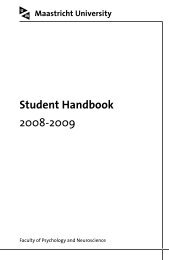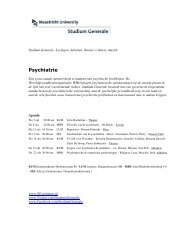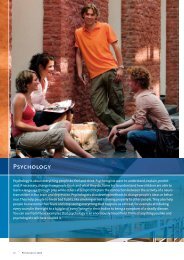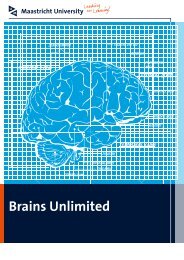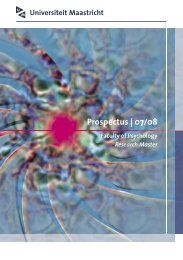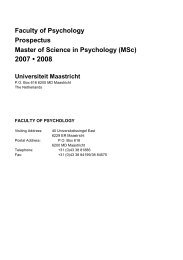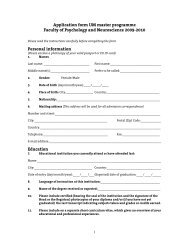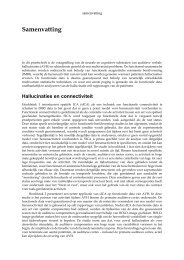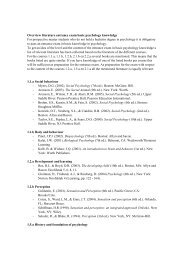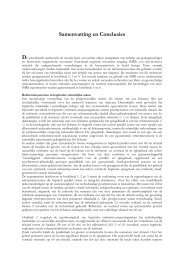Prospectus | 08/09 - Psychology and Neuroscience - Maastricht ...
Prospectus | 08/09 - Psychology and Neuroscience - Maastricht ...
Prospectus | 08/09 - Psychology and Neuroscience - Maastricht ...
Create successful ePaper yourself
Turn your PDF publications into a flip-book with our unique Google optimized e-Paper software.
<strong>Prospectus</strong> Research Master <strong>Psychology</strong> 20<strong>08</strong> • 20<strong>09</strong><br />
Literature<br />
Recent journal articles <strong>and</strong> book chapter.<br />
Instructional Approach<br />
Lectures, group meetings <strong>and</strong> practical sessions.<br />
56<br />
Form of Assessment<br />
Presentation, written examination <strong>and</strong> evaluation of practical performance.<br />
| 419FN Stress, Emotions <strong>and</strong> Affective Disorders – 4 credits<br />
Coordinator: Daniël van den Hove, Psychiatry & Neuropsychology (FHML),<br />
Phone 38 84120, 50 Universiteitssingel, Room 1.110, E-mail: d.v<strong>and</strong>enhove@np.unimaas.nl<br />
Description of the Course<br />
Almost everybody knows what it is like to feel nervous or anxious: for instance the<br />
tension one feels before an examination or the way the heart pounds when one is in<br />
danger. Stress rouses the mind <strong>and</strong> body for (re)action so the individual is able to face<br />
a threatening situation. If the reaction is appropriate one can cope with the stressor.<br />
Yet chronic <strong>and</strong>/or excessive stress may lead to the development of psychiatric<br />
conditions such as depression <strong>and</strong> anxiety, in which the patient shows inadequate<br />
coping associated with a severe disruption of daily life. A major challenge in research<br />
on stress <strong>and</strong> related disorders is to unravel the molecular basis of persistent changes<br />
in behaviour that explain the symptoms of mental illness <strong>and</strong> their (partial) reversal<br />
during treatment. This course focuses on the psychobiology of stress, emotions <strong>and</strong><br />
associated disorders such as depression <strong>and</strong> anxiety. It will cover various neuroscientific<br />
areas like molecular neurobiology, but also functional neuroanatomy, neurophysiology<br />
<strong>and</strong> neuropsychopharmacology. Major focus will be on the limbic system, the<br />
sympathetic nervous system <strong>and</strong> the hypothalamo-pituitary-adrenal axis as key<br />
players of emotional regulation in health <strong>and</strong> disease. Further, the role of different<br />
neurotransmitter systems such as the serotonergic system will be discussed in depth.<br />
Literature<br />
Recent journal articles <strong>and</strong> book chapters.<br />
Instructional Approach<br />
Lectures, group meetings <strong>and</strong> practical sessions.<br />
Form of Assessment<br />
Written examination <strong>and</strong> evaluation of practical performance.



